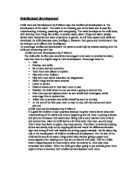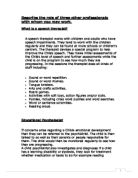One month: respondes to soothing voices if upset
Three months: recognise main carer’s voice before being touched. Turns to sounds that they recognise e.g bath times.
Six months: respondes to his own name and different tones in carer’s voice. They start to make a wide variety of sounds.
Nine months: looks for fallen toy in the right direction. Starts to understand the word “no” and “bye bye.” Makes sounds listens then starts to make sounds again.
One year: imitates adults enthusiastically understands simple instructions.
Have three or more words. They can start to point out random objects.
Eighteen months: has a vocabulary of about fifteen words. Interested in their image in the mirror.
Children
Parents who get their children to read, sing and play with them on a regular basis are building an intellectual relationship.
Learning and playing
Long before kids head of to school for the very first time have well established learning habits.
School encourages children to make up stories and poems to show of their imaginations.
Children that are school age only see things from one point of view sometimes this happens in infancy as well.
Children at the age of 4 + feel good in them selves if they do something right.
They can start writing their own sentences at the age of just 6 +.
Can understand the order of daily routines.
Can count objects out loud, but sometimes not in the right order.
Can adapt languages easily.
Continues the same activity to 10 – 15 minutes.
Children don’t think logically. Sometimes they think they are doing the right thing, when their not.
Children can only sometimes use limited logic when they think about the same thing for to long.
Children from just an early age can understand what their mother or father is saying to them.
Children do a great deal off learning from the ages of 4- 11 years old.
As a child your muscles start to work more formally. You start recognising familiar faces. Children get competitive so when you play games, sometimes they don’t like loosing and say something like you cheated. Eg. On sports day they will run as fast as they can just to beat their competision.
Adolescents
Throughout puberty adolescents don’t concentrate on all the important things such as school or parents.
Many adolescents engage in risky activities, such as driving fast.
Some adolescents may engage in illegal risks, such as theft, drink and drugs.
There is evidence of the child between 12 – 16 to learn the most in the years.
Encourages themselves to go for what they want.
There sometimes are changes in the mind aswell as the body.
It is special times were these Adolescents start to learn in all different ways.
Adolescents can understand more difficult concepts than children can.
Adolescents can think of something on the spot without even think of it or look at it.
Sometimes because the adolescence is growing up and has realised they have more ability it starts arguments between their parents and disagreements with others.
Yet again Adolescents are most likely to make more friends in that period of time.
Adulthood
In adulthood the intellectual part continues to develop. Getting a job means learning new skills.
Adults learn more when they leave their home and have to provide for them to live independatly.
Raising children also involves new skills.
As an adult starts getting older and age independatly. They start to react more slowlyand find it difficult to remember things when they are under pressure.
But yet the more experience the adults have the better they are at solving problems and making decisions.
Adulthood seem to have more concerntration than any of the other life stages.
Slow intellectual skills in childhood can follow through to your adulthoods.
In adulthood you have different ways of expressing yourself.
Some people just take opinions on people. Some adults come across as rude.
Adulthood is the time you express how you feel and put it in words.
People have rated adulthood the best time of their lifes. That so much happens and you learn much more in adulthood.
Later Adulthood
Intellectual changes in late adulthood do not always result in reduction of ability. While fluid intelligence does decline in later years, crystallized intelligence has been shown to rise slightly over the entire life span
The elderly tend to lose their memerory and become more self conscious. Some elderly people even forget their kids.
The later adulthood is one of the stages where your mind shuts down, sometimes it can be caused by an illness that cannot be helped, or sometimes it is just caused by old age.
If the elderly remember back to when they were young, I bet they have some amazing stories to tell…






